- Home
- Ian Mcewan
Machines Like Me Page 5
Machines Like Me Read online
Page 5
I had no ambition but to walk off my restless state. I increased my pace through the business end of the High Street. I passed the boarded-up office of the Anglo-Argentinian Friendship Society. A rubbish collectors’ walkout was in its second week. The bags piled round lamp posts were waist-high and the heat was generating a sweet stench. The public, or its press, agreed with the prime minister, that a strike at such a time was an act of heartless disloyalty. But the wage demands were as inevitable as the next rise in inflation. No one knew yet how to dissuade the snake from eating its tail. Very soon, perhaps by the end of the year, stoical robots of negligible intelligence would be picking up the rubbish. The men they displaced would be even poorer. Unemployment was at sixteen per cent.
By the curry house and along the greasy pavement outside the fast-food chains, the smell of rotting meat was a force that hit the chest. I held my breath until I was past the Tube station. I crossed the road and walked onto the Common. There were shouts and squeals rising from a crowd by the boating and paddling pool. Even some of the kids splashing about were wearing ribbons. It was a happy scene but I didn’t linger. In these new times a solitary man had to be wary of seeming to stare at children.
So I strolled over to Holy Trinity Church, a huge brick Age of Reason shed. There was no one inside. As I sat, hunched forward, elbows on knees, I could have been mistaken for a worshipper. It was too reasonable a place to evoke much awe, but its clean lines and sensible proportions were soothing. I was content to stay a while in the cool gloom and let my thoughts drift back to our very first night together when I’d been woken by a prolonged howl. I thought a dog was in the room and I was half out of bed before I came to and realised that Miranda was having a nightmare. It wasn’t easy to wake her. She was struggling, as if fighting with someone, and twice she mumbled, ‘Don’t go in. Please.’ Afterwards, I thought it would help her to describe the dream. She was lying on my arm, clinging to me tightly. When I asked her again, she shook her head, and soon she was asleep.
In the morning, over coffee, she shrugged my question away. Just a dream. That moment of evasion stood out because Adam was behind us, making a good job of cleaning the window, which I had told him, rather than asked him, to do. While we were talking, he had paused and turned, as if intrigued to hear an account of a nightmare. I wondered then if he himself was subject to dreams. He was on my conscience now. My command that morning had been snappish. I shouldn’t have treated him like a servant. Later that day I had powered him down. I had left him switched off too long. Holy Trinity Church was associated with William Wilberforce and the anti-slavery movement. He would have promoted the cause of the Adams and Eves, their right not to be bought and sold and destroyed, their dignity in self-determination. Perhaps they could take care of themselves. Soon, they’d be doing the dustmen’s jobs. Doctors and lawyers were next in line. Pattern recognition and faultless memory were even easier to compute than gathering up the city’s filth.
We could become slaves of time without purpose. Then what? A general renaissance, a liberation into love, friendship and philosophy, art and science, nature worship, sports and hobbies, invention and the pursuit of meaning? But genteel recreations wouldn’t be for everyone. Violent crime had its attractions too, so did bare-knuckle cage-fighting, VR pornography, gambling, drink and drugs, even boredom and depression. We wouldn’t be in control of our choices. I was proof of that.
I wandered out across the open spaces of the Common. Fifteen minutes later I reached the far side and decided to turn back. By now, Miranda should have made at least a third of her decisions. I was impatient to be with her before she set off for Salisbury. She would be back late that night. I was resting from the heat in the narrow shade of a silver birch. A few yards away was a fenced-in little swing park for children. A small boy – I guessed he was about four years old – dressed in baggy green shorts, plastic sandals and a stained white t-shirt, was bent over by a see-saw examining an object on the ground. He tried to dislodge it with his foot, then he crouched down and got his fingers to it.
I hadn’t noticed his mother sitting on a bench with her back to me. She called out sharply, ‘Get here!’
The boy looked up, seemed about to go towards her, then his attention returned to the interesting thing on the ground. Now he had moved, I saw it myself. It was a bottle top, glinting dully, perhaps embedded in the softened tarmac.
The woman’s back was broad, her hair black, curly, thinning towards the crown. In her right hand was a cigarette. Her elbow was cupped in her left hand. Despite the heat, she was wearing a coat. Below the collar was a long tear.
‘D’you hear me?’ The threat was on a rising note. Again, the child looked up and seemed fearful and bound to obey. He took a half-step but, as his gaze shifted, he saw his prize again and faltered. When he went back to it, he may have thought he could lever it free and take it to his mother. But what he may have reasoned didn’t matter. With a yelp of frustration, the woman leaped from the bench, crossed the few yards of playground at speed and dropped her cigarette as she grabbed the boy by his arm and smacked his bare legs. At the instant of his first cry, she smacked him again, and a third time.
I’d been comfortable in my thoughts and was reluctant to be taken from them. For a moment I thought I could head for home, pretending, if not to myself then to the world, that I’d seen nothing. There was nothing I could do about this little boy’s life.
His screams were angering his mother further. ‘Shut up!’ she shouted at him over and over again. ‘Shut up! Shut up!’
Even then, I might have forced myself to ignore the scene. But as the boy’s shrieks grew louder, she seized his shoulders in two hands, pulling his dirty t-shirt clear of his belly, and began to shake him hard.
There are some decisions, even moral ones, that are formed in regions below conscious thought. I found myself jogging towards the playground’s fence, stepping over it, taking three paces and putting a hand on the woman’s shoulder.
I said, ‘Excuse me. Please. Please don’t do that.’
My voice sounded prissy in my ears, privileged, apologetic, lacking all authority. I was already doubting where this could lead. Not to a future of reformed, kindly parenting. But at least, as she turned towards me in disbelief, her assault had ceased.
‘What was that?’
‘He’s just little,’ I said stupidly. ‘You could do him serious harm.’
‘Who the fuck are you?’
It was the right question and for that reason I didn’t answer it. ‘He’s too little to understand you.’
This conversation was proceeding over the child’s screams. Now he clutched at his mother’s skirts, wanting to be picked up. This was the worst of it. His tormentor was also his only comfort. She was squaring up to me. The dropped cigarette smouldered by her foot. Her right hand clenched and unclenched. Trying to appear not to, I took a vague half-step back. We were staring each other out. It was, or had been, a rather lovely, intelligent face, its obvious beauty marred by weight-gain plumping up the flesh round her eyes, narrowing them into a look of suspicion. In another life it could have been a kindly, maternal face. Rounded, high cheekbones, a slew of freckles across the bridge of her nose, full lips – though the lower was split. After several seconds, I noticed that her pupils were pinpricks. She was the first to shift her gaze. She was looking over my shoulder and then I found out why.
She yelled, ‘Oi, John.’
I turned. Her friend or husband, John, also plump, naked from the waist, bright pink from a bout in the sun, was on his way through the playground’s wire gate.
Still several yards away he called, ‘He bothering you?’
‘Fucking right.’
In some other sector of all imagined possibilities – the cinematic would be one – I needn’t have worried. John was about my age, but shorter, flabbier, less fit, less strong. In that other world, if he’d struck me, I could have floored him. But in this world, I’d never hit another person in my life,
not even in childhood. I could have told myself that if I knocked the father down the child would suffer all the more. But that wasn’t it. I had the wrong attitude, or rather, I lacked the right one. It wasn’t fear, it certainly wasn’t lofty principle. When it came to hitting people, I didn’t know where to begin. I didn’t want to know.
‘Oh yeah?’
Now John was squaring up to me, the woman having stepped back. The boy continued to wail. Father and son were comically alike – both crop-haired, ginger-blond, with small faces and wide-apart green eyes.
‘With all respect, he’s just little. He shouldn’t be hit or shaken.’
‘With all respect, you can fuck off out of it. Or else.’
And John did look ready to hit me. His chest was puffed out, the ancient self-enlargement ploy of toads and apes and many others. His breathing was rapid and his arms hung well clear of his torso. I may have been stronger, but he would be more reckless. Less to lose. Or this was what bravery was. Being ready to take a chance on not getting felled and your head lifted and slammed down on the tarmac many times, with lifelong neural consequences. A chance I wouldn’t take. This was what cowardice was, a surfeit of imagining.
I raised both hands in a gesture of surrender. ‘Look. I can’t make you do anything, obviously. I can only hope to persuade you. For the little boy’s benefit.’
Then John said something so surprising that I was completely outflanked and for a moment could hardly reply.
‘Do you want him?’
‘What?’
‘You can have him. Go on. You’re an expert on kids. He’s yours. Take him home with you.’
The child had gone quiet by this point. Looking at him again, I thought he had something his father lacked, though perhaps not his mother – a faint but still luminous signal in his expression of intelligent engagement, despite his distress. We stood in a tight little group. From far across the Common we heard, above the traffic, the distant shouts of children by the paddling pool.
On an impulse, I called the father’s bluff. ‘All right,’ I said. ‘He can come and live with me. We’ll sort out the paperwork later.’
I took a card from my wallet and gave it to him. Then I put my hand out to the boy and to my surprise he raised his and slotted his fingers between mine. I felt flattered. ‘What’s his name?’
‘Mark.’
‘Come on Mark.’
Together we walked away from his parents, across the playground to the spring-hinged gate.
The little boy said in a loud whisper, ‘Let’s pretend to run away.’ His upturned face was suddenly alive with humour and mischief.
‘OK.’
‘On a boat.’
‘All right.’
I was about to open the gate when there was a shout behind me. I turned, hoping that my relief didn’t show. The woman came running at me, pulled the boy away and swung at me with an open hand. The blow fell harmlessly against my upper arm.
‘Pervert!’
She was ready to take another swing when John called out in a weary tone. ‘Leave it.’
I let myself out and walked a little way before stopping to look back. John was hoisting Mark onto his raw shoulders. I had to admire the father. There may have been wit in his methods which I’d failed to notice. He had got rid of me without a fight by making an impossible offer. What a nightmare, to drag the boy back to my tiny place, introduce him to Miranda, then see to his needs for the next fifteen years. I noticed that the woman had a black ribbon tied to the arm of her coat. She was trying to persuade John to take his shirt. He was ignoring her. As the family crossed the playground, Mark turned in my direction and raised an arm, perhaps to maintain his balance, perhaps in farewell.
*
In our side-by-side conversations in bed, often in the early hours, a figure presided whose form was becoming clearer as he hovered before us in the darkness, an unfortunate ghost. I had to overcome an initial impulse to regard him as a rival, hostile to my very existence. I looked him up online and saw his face through time, from early twenties to mid-fifties, evolving from girlishly handsome to appealingly ruined. I read his press, which was not extensive. His name meant nothing to me. A couple of my friends knew of him but had never read him. A profile, five years old, dismissed him as ‘an almost-man’. Since the phrase described one of my own possible fates, I warmed a little to Maxfield Blacke, and understood the obvious – that to love the daughter would be to embrace the father. Whenever she returned from Salisbury, she needed to talk about him. I learned about his different pains, or agonies, the shifting prognoses, the arrogant, ignorant doctor followed by the kind and brilliant doctor, the chaotic hospital with surprisingly good food, the treatments and medications, the fresh hopes abandoned then restored. His mind, she found countless ways of saying, remained sharp. It was his body that had turned against him, against itself, with the ferocity of a civil war. How it hurt the daughter to see the writer’s tongue disfigured by ugly black spots. How it hurt the father to eat, to swallow, to speak. His immune system was letting or taking him down.
There was more. He passed a large kidney stone, as excruciating, Miranda believed, as natural childbirth. He broke a hip on the bathroom floor. His skin itched intolerably. Now he had gout in the joints of both thumbs. Reading, his passion, was made difficult as cataracts clouded his vision. The operation was ahead of him, though he hated and feared anyone messing with his eyes. There may have been other afflictions too humiliating to recount. The woman he should have asked long ago to be his fourth wife had walked out two years ago. Maxfield was alone, dependent on health visitors, strangers, and on his daughter, ninety miles distant. His two sons by another marriage sometimes travelled from London, bringing presents of wine, cheese, biographies, the latest wristwatch computer. But they were squeamish about their father’s intimate care.
We weren’t old enough, Miranda and I, to understand fully that a man in his late fifties was still too young to expect or deserve such multiple insults. But his resemblance to Job tortured by his pitiless God made it seem blasphemous to do anything but listen to Miranda. The night after my encounter in the playground stood out. Hard to believe of a man in love, but my mind wandered as she talked about him. She was just back from Salisbury, describing a fresh torment as we lay in bed. Sympathetically, I took her hand as she talked. The constant sufferings of a man I had never met could only hold me so long. Half listening, I was free to contemplate my life’s strange new turns.
Downstairs, still on the same hard wooden chair, my interesting toy waited under its blanket, its merged personality installed that afternoon while it slept. The adventure was about to begin. At my side was my future, I was sure of it. The imbalance in our feelings for each other would be righted. We were simply the embodiment of a pattern in modern manners: acquaintance, followed by sex, then friendship, finally love. There was no good reason we should travel this conventional course at the same speed. Patience was all.
Meanwhile, surrounding my islet of hopes was an ocean of national sorrow. With ghastly timing, the junta had raised that day 406 Argentine flags in Port Stanley, one for each of their dead, and staged a military parade along the deserted, sodden main street, while in London, in St Paul’s, a commemoration service was held for our 3,000. I watched it on television after I returned from the Common. There could hardly have been two dozen in that vast congregation of the ruling elite who thought that a God who preferred fascism to the Union Jack was worth the candle; or that the departed reposed in eternal bliss. But secular tradition couldn’t provide such familiar verses polished to a gleam by the long-discarded sincerity of previous generations. Man that is born of woman hath but a short time to live. So the hymns were sung, the impenetrable, echoing readings intoned, the responses returned in ragged unison, while the rest of us mourned at the altars of our TV sets. Unlike Miranda, I mourned too.
With a million and a half others I had ‘marched’ through central London to protest against the Task Force. In fact, w
e crept along, stopping to wait at many bottlenecks. The usual paradox held: the matter was grave, the demonstration joyous. Rock bands, jazz bands, drums and trumpets, witty banners, wild costumes, circus skills, speeches, and above all the exhilaration of such numbers, taking hours to file past, so diverse, so clearly decent. So easy to believe that the whole nation had invaded London to make the obvious point that the coming war was unjust, inhumane, illogical, potentially catastrophic. We couldn’t know just how right we were. Or how effectively Parliament, the tabloids, the military and two-thirds of the nation would dismiss us. It was said we were unpatriotic, defending a fascist regime and opposing the rule of international law.
Where was Miranda that day? We barely knew each other then. She was in the library, making the final changes to her half-wild pigs paper. She had unusual ideas about the Task Force for someone in her twenties, and she distrusted the spirit of what she called a ‘self-loving crowd’, its easy like-mindedness, its stupid high spirits. She didn’t share my aptitude for protest or sentiment. She was not interested in watching the ships leave, or in what came to be known as The Sinking, or the inglorious return and still less the service in St Paul’s. Where I had talked with friends about nothing else for months and read every opinion on the affair, Miranda stayed away. When the ships sank, she was silent. When the black ribbons appeared, she wore one, but she wouldn’t be drawn. As she put it, the whole episode ‘stank’.
Now, as I lay beside her with her hand in mine, the orange street lights beyond the curtains gave her bedroom the appearance of a stage set. She had taken the last train home and waited for a delayed Tube to Clapham North. It was almost three o’clock. She was describing how Maxfield had told her ruefully that the gout in his thumbs was a blessing. The pain was so ferocious and localised that his other complaints had faded.

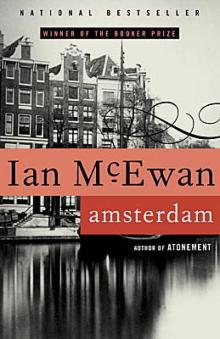 Amsterdam
Amsterdam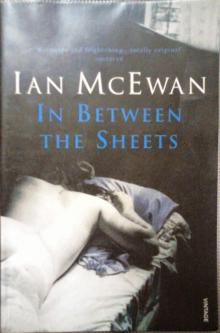 In Between the Sheets
In Between the Sheets Atonement
Atonement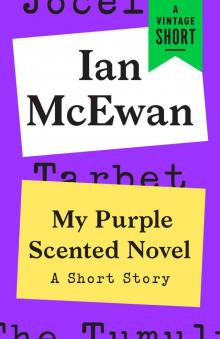 My Purple Scented Novel
My Purple Scented Novel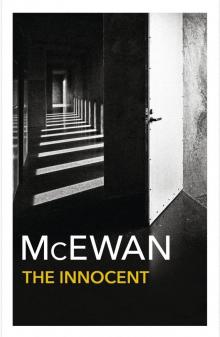 The Innocent
The Innocent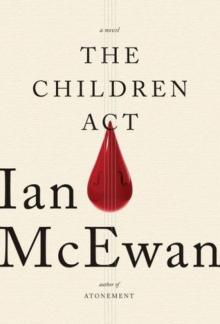 The Children Act
The Children Act Enduring Love
Enduring Love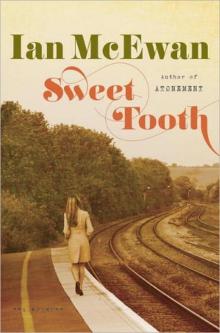 Sweet Tooth
Sweet Tooth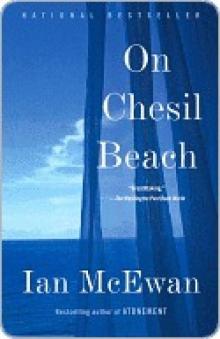 On Chesil Beach
On Chesil Beach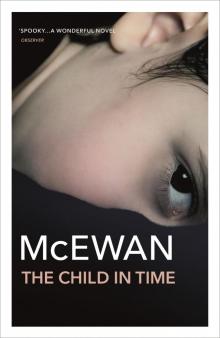 The Child in Time
The Child in Time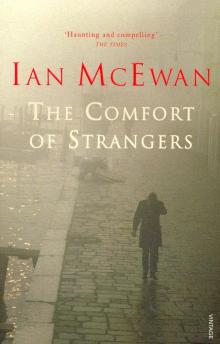 The Comfort of Strangers
The Comfort of Strangers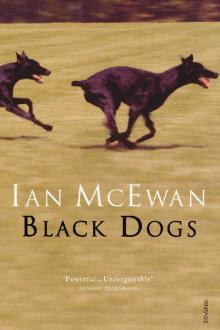 Black Dogs
Black Dogs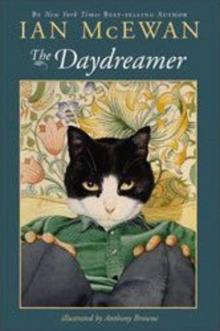 The Daydreamer
The Daydreamer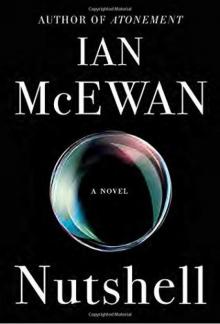 Nutshell
Nutshell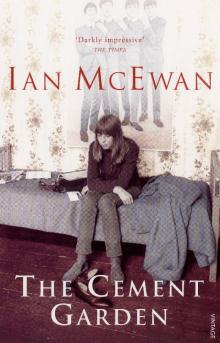 The Cement Garden
The Cement Garden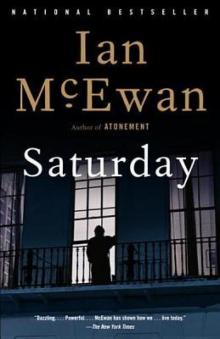 Saturday
Saturday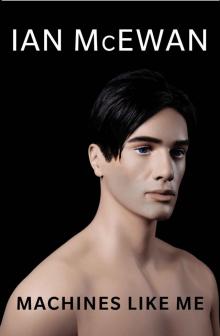 Machines Like Me
Machines Like Me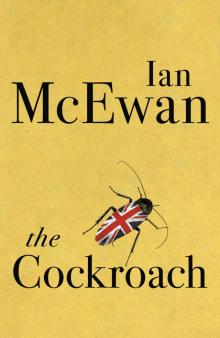 The Cockroach
The Cockroach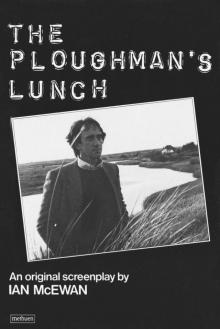 The Ploughman’s Lunch
The Ploughman’s Lunch